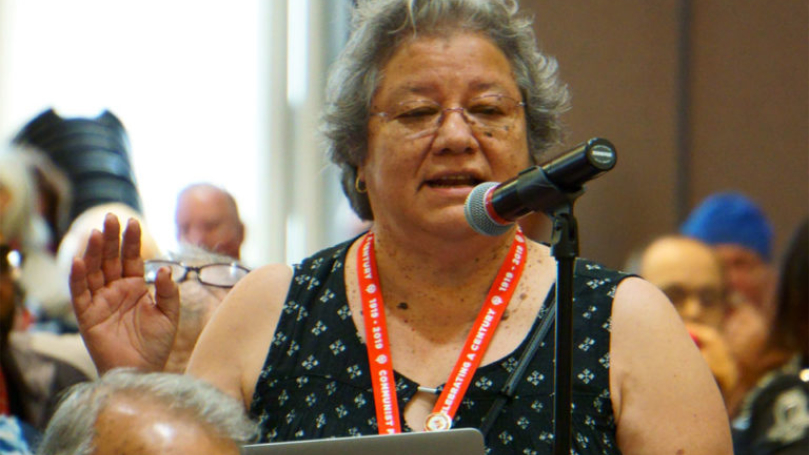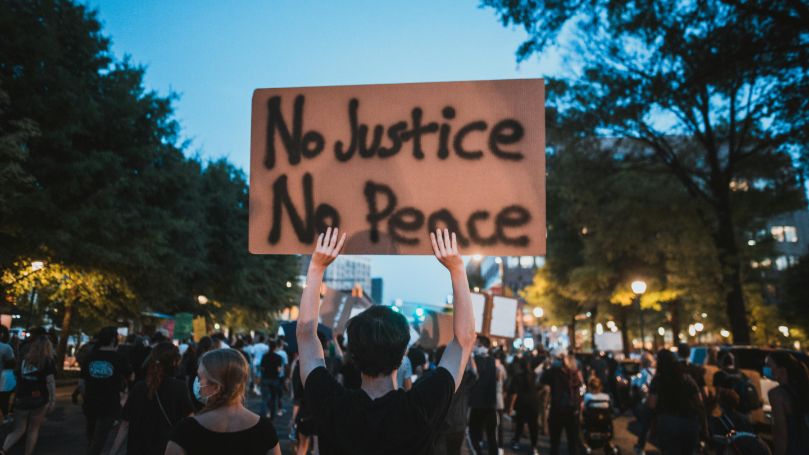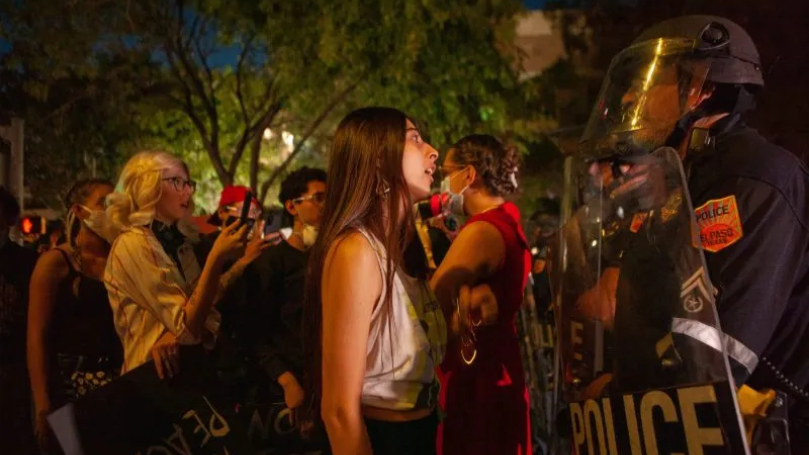
The following address was given on Saturday, Nov. 8, 2025 by Rossana Cambron at the opening of the CPUSA’s Peace Conference 2.0: Driven by Justice — United for Peace.
Back in 2023, when plans for the first peace conference were underway, the peace movement in the U.S. felt weak and divided. Many of the old anti-war groups seemed to have lost their energy. Then came the October 7th Hamas attack, followed by Israel’s massive and deadly assault on Palestine. That tragedy reawakened people’s sense of justice. Across the country, thousands took to the streets demanding a ceasefire and freedom for Palestinians.
Maybe the peace movement didn’t disappear — it just needed a spark to wake it up. In the months that followed, hundreds of thousands of people marched for peace, justice, and Palestinian self-determination.
Then came another big shock — Donald Trump’s reelection one year later. During his campaign, he pretended to stand for peace and working people. But as soon as he took office, he showed his real face. His administration launched new wars abroad and at home: bombing Iran, backing the far-right Netanyahu government in Israel, sending federal troops into cities like Los Angeles and Chicago, and recently ordering killings in the Caribbean, as a provocation and pretext for a Venezuelan invasion. He put a Christian Nationalist TV host in charge of the Pentagon, renamed it the “Department of War,” and fired women and people of color from top positions.
Trump is not for peace, and he’s not for working people. We need to find creative ways — through social media, music, theater, art, and everyday conversation — to make that truth clear to everyone.
Now, in his second term, Trump’s government is cracking down harder on anyone who dares to speak out for peace. Using the Heritage Foundation’s “Project Esther” plan, they’ve labeled all criticism of Israel as “antisemitic” and any pro-Palestine work as “terrorist support.” This has been used to silence students, teachers, and activists, and to scare people away from joining protests.
As we approach the 2026 midterm elections, Trump’s allies are trying to make one-party rule permanent — by rigging voting maps, restricting who can vote, and even planning to use soldiers to intimidate voters in big cities. If they succeed, the oligarchy will tighten their control, corporations will gain more power, and working people will face more repression both here and abroad.
A new kind of peace movement
That’s why we need a new kind of peace movement — one that unites people fighting for peace abroad with those fighting for civil rights, women’s rights, immigrant rights, labor rights, environmental justice, and equality for all. We must stand together to stop troops in our cities, deportations in our neighborhoods, and violence both overseas and at home.

This is the goal of our peace conference. We believe, like Dr. Martin Luther King Jr., that peace is more than just the end of war — it’s the presence of justice. We want a movement strong enough to change U.S. foreign policy and how our tax dollars are spent.
As Antonio Gramsci said, “The old world is dying, and the new world struggles to be born. Now is the time of monsters.” We are living through that moment — but out of this chaos, a better world can rise. Our job is to help people see through propaganda and take action to make that change real.
We have to show that peace is possible and something we can all help build. People need to see that a peace movement is a way to protect our families, our jobs, and our planet.
Most people in the United States want to live in a peaceful world. But many have been told that war is inevitable, or that peace is unrealistic. We have to show, through real examples, that peace is possible and that it’s something we can all help build. People need to see that a peace movement isn’t just an idea, or an act of solidarity. It’s a way to protect our families, our jobs, and our planet.
We also need to understand the difference between short-term protests against a specific war and the long-term, organized peace movement. Sometimes a war sparks huge spontaneous rallies or demonstrations. But even when the bombs stop falling, other kinds of war continue — economic wars, proxy wars, coups, assassinations, sanctions, and occupations. The peace movement is made up of people who clearly understand and know that without justice, there can be no peace.
Those sudden anti-war upsurges are part of the larger peace movement, and the peace movement helps sustain them in return. Together, they are the heartbeat of resistance.
Capitalism drives war
As Marxist-Leninists, we understand that capitalism itself drives war. The pursuit of profit — the constant push for new markets, cheaper labor, and control over resources — creates a system that feeds on conflict. War is profitable for the few; peace uplifts the many.
We are clear that the attacks on Venezuela are not to fight cartels or anything that benefits working people; it is about gaining access to their oil and other resources for more profits. I believe that we can agree on the need to organize in support of preventing an attack on Venezuela. How we respond strategically is key. Is attending a march or rally enough, or would other forms have a greater impact given that the sentiment of the U.S. people is more and more against wars?
Right now, many people fighting for peace and justice don’t yet see that connection between capitalism and war. They may focus on ending one particular war, or on supporting the troops, without realizing that the same system that exploits workers also fuels endless wars.
We have to show how the drive for profit and imperialist control leads to suffering both abroad and at home.
To build a solid, lasting peace movement, we need to help working people make that connection. We have to show, in plain language, how the drive for profit and imperialist control leads to suffering both abroad and at home.
We can do this by telling real stories, sharing clear facts, and finding ways to talk about imperialism that connect with people’s daily struggles — wages, healthcare, housing, and safety.
You don’t have to call yourself anti-imperialist to make a valuable contribution to the fight for peace. But without an anti-monopoly movement that takes on corporate power, we’ll never get to the root of war itself. Otherwise, peace activists risk jumping from one cause to another — opposing this war, supporting that one — without recognizing the common thread of imperialism that ties them together.
This lack of understanding can lead to contradictions. Some may oppose the genocide of Palestinians while backing the war in Ukraine, or reject the blockade of Cuba while calling for regime change in Venezuela. To win real peace, we need clarity, unity, and a shared vision that links every struggle against exploitation and domination.

Why is the U.S. always at war? Because it’s profitable for the rich. The war industry — made up of weapons companies, big banks, oil and gas giants, and drug corporations — feeds off endless conflict. They all have a stake in keeping the military budget enormous.
Unity for peace
They say the military budget keeps us safe, but that’s not true. Many people believe that a large portion of this budget goes to pay our troops, but what they do not know is that, according to the Army’s own statistics, many military families are on food stamps (i.e. SNAP), they struggle to make a living wage, and basic needs like health care, housing, and education are ignored. Meanwhile, war helps corporations grab land, cheap labor, and natural resources abroad.
War also destroys the planet. The U.S. military is one of the biggest polluters on Earth. That’s why the peace movement must join hands with the environmental movement — because the fight for peace is also a fight for the planet.
Imagine if all the trillions spent on war were instead used for good-paying jobs to clean our water, feed our people, care for our sick, and rebuild our schools and communities.
We need to demand that the Pentagon be audited — let the people see where our tax dollars are really going. Imagine if all the trillions spent on war were instead used for good-paying jobs to clean our water, feed our people, care for our sick, and rebuild our schools and communities. Peace would mean opportunity, safety, and dignity for everyone — not just profits for a few.
One of our biggest challenges is that many people who oppose Trump’s far-right agenda still support U.S. wars abroad. That’s where our work begins. We have to patiently show, with facts and examples, that war isn’t about freedom — it’s about profit and exploitation.
We must win people over by offering hope and a clear understanding of the bigger picture. Peace is not weakness; it’s strength rooted in justice and solidarity.
Here are a few key principles for a Unity Program for Peace:
- Respect for all nations’ sovereignty. Every country should have the right to make its own choices without being bullied by the U.S. or any other power.
- Diplomacy over war. We demand ceasefires in Ukraine and Palestine, humanitarian aid, and fair negotiations, not more bombs.
- No first-use of nuclear weapons. End the nuclear arms race on Earth and in space.
- Cut the military budget. Move billions from war spending into programs that serve human needs — a green and peaceful economy that leaves no worker behind.
- Transparency and accountability, especially from the war industry, which must disclose its environmental impact.
Our Party has always stood for peace, from fighting against Italy’s invasion of Ethiopia in the 1930s to joining the mass protests against the Vietnam War. We know that the struggle against imperialism abroad is linked to the fight for workers’ rights, equality, and democracy at home.
Our strength lies in our working-class roots. We bring a clear, Marxist understanding that exposes how corporations and the wealthy profit from war. We can help the movement see peace as part of the broader fight against fascism and for democracy.
As we go forward, we must continue to build in our communities, through both political as well social activities, including open mic nights, chess clubs, book clubs, video game groups, and more. Anywhere you engage with others and discuss current events can help build the peace movement, and, of course, build our party along the way.
We need to develop clarity how each issue — whether it be healthcare, a livable wage, affordable housing, or other issues — is connected to the need to build a strong united peace movement. A tool kit has been developed to assist in this effort.
To make this concrete, we aim to:
- Advocate for peaceful conflict resolution.
- Defend every nation’s right to self-determination.
- End war profiteering.
- Stop U.S. bullying of other nations.
- Transition from a war economy to a green, peaceful economy that provides for all.
- Protect the planet from the destruction of war.
This past Tuesday’s election showed just how strong the fightback has grown. The anti-communist attacks mostly fell flat. Voters were more moved by the real track record and dedication of the activists than by any divisive scare tactics. People showed they understand that power truly belongs in their hands. Why else would so many stand in long lines to vote — even in places like California, where Prop 50 had already been declared a winner? When asked, many said they still wanted to cast their vote as a way to show their disgust with what the president is doing.
We have to seize this moment.
Peace is not just the end of fighting; it’s the start of justice. We have the power, together, to build that kind of peace. But it will take courage, creativity, and unity from all of us — from the picket line to the protest march, from classrooms to concert stages.
Now is the time to rise together for peace, for justice, and for the future we all deserve.
Image: Rossana Cambron speaks at a CPUSA convention by People’s World; No justice no peace by Kelly (Free to use); A young woman injured by a bean bag round confronts officers, photo by Corrie Boudreaux/El Paso Matters (Creative commons).


 Join Now
Join Now